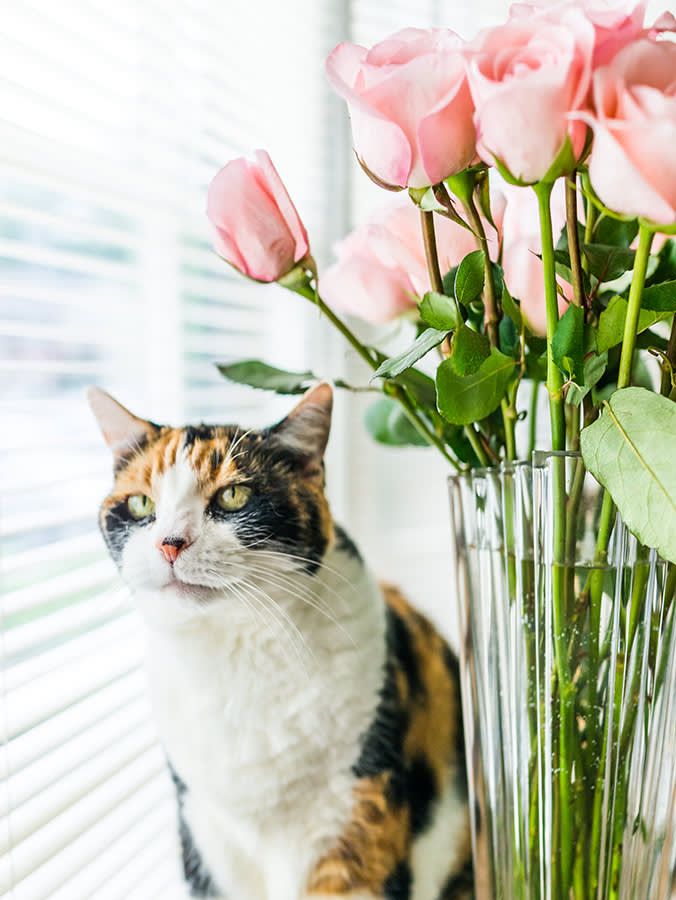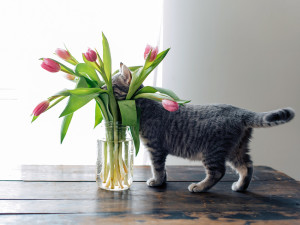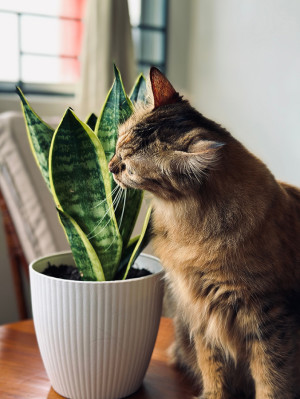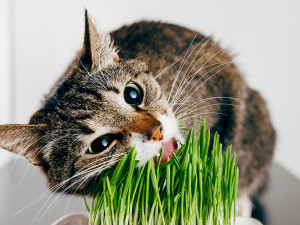Are Roses Toxic to My Cat?
Let’s just say this: There’s no excuse for your partner not to bring you a bouquet of these.

share article

Your pet wants you to read our newsletter. (Then give them a treat.)
Cat parents who are treated to a beautiful bouquet of roses don’t have to worry about bringing them home to their curious kitties. Roses are not toxic to cats. While any plant material a cat eats can cause some stomach upset, roses do not contain any substances that are toxic to cats.
Are roses dangerous to cats?
Roses (Rosa genus) can cause mild issues if eaten or interacted with but are not considered toxic to cats. There are a couple of possible dangers to having roses around your feline friends, but these can be avoided with some simple precautions and watchfulness.
Unless de-thorned, roses contain sharp prickles that pose a hazard to any creature looking for a snack, including curious cats. Kitties will often grab their “prey” with their paws before chomping down, and this could lead to wounds on their paws. Cats who enjoy rubbing their faces on everything in their domain run the risk of getting scratched as well.
Cats aren’t used to eating much plant material, so ingesting rose petals could upset their stomach despite not containing any toxins. This may result in an episode or two of vomiting that contains chewed bits of rose but should not make the cat feel sick for any significant amount of time.
What should I do if my cat has eaten a rose?
The best way to deal with your cat eating a rose is to move any remaining roses out of their reach. Although roses aren’t toxic, cats shouldn’t be allowed to gorge themselves on them. Plus, who wants their beautiful roses chewed to bits?
Diagnosing plant poisoning in cats
Plant poisoning is generally diagnosed either by cat parents seeing their kitty eating a toxic plant, seeing evidence of bite marks or missing petals on the plant, or knowing that there are toxic plants in the area. Fortunately, roses are not a cause for plant poisoning in cats and can be kept around them safely.
Symptoms of rose ingestion in cats
If you know your cat has ingested a rose, watch for any signs of nausea or vomiting. An episode or two of vomiting is not a reason for concern if your cat is acting normally otherwise and still interested in food after you’ve allowed their stomach to settle for a few hours. If your cat continues to vomit or seems sick in other ways, contact a veterinarian for advice. Something other than the roses could be causing their issues.
Treatment for rose ingestion in cats
No treatment is required for cats who have ingested roses and are not showing any symptoms. Cats who are having persistent vomiting, loss of appetite, or other symptoms should be checked by a veterinarian for signs of dehydration or other causes of nausea. Depending on the severity of the symptoms and other findings, a veterinarian may recommend subcutaneous fluids and anti-nausea medication.
How to prevent plant poisoning
The best way to prevent plant poisoning in cats is to keep toxic plants out of your home. In general, do your best to keep plants out of your cat’s reach, especially if your cat likes to bite on hanging leaves and fronds. This will help prevent stomach upset for your cat and help your plants stay healthy and beautiful.
Are all parts of roses safe for cats?
All parts of roses are non-toxic to cats. Cats that interact with the sharp thorns on rose stems can get pricks or scratches from them. Scratches to the eye are particularly dangerous and may occur when a cat tries to leave their scent on the plant by rubbing their face on it. It would be unusual for a cat to try to eat a thorny rose stem, but the thorns could pose a danger if swallowed whole. Report any missing thorns or parts of a rose stem to your vet if you suspect your cat has tried to eat them
How do I stop my cat from eating roses?
Cats are not known for appreciating the aesthetic benefits of flowers in their environment and may not enjoy having a vase full of roses on their favorite perch. Keep roses away from areas and surfaces that your cat frequents and keep them in a sturdy container that cannot be knocked over easily.
If you see your cat showing interest in your roses, redirect them onto a toy, laser pointer, or other activity they enjoy. Positive reinforcement of good behavior is the best way to prevent unwanted behavior.
The bottom line: Are roses poisonous to my cat?
Roses are not poisonous to your cat. Despite not being toxic, it’s a good idea for cat parents to redirect their kitties away from roses and other plants to prevent stomach upset, scratches from thorns, ruined plants, and broken vases. Always check to see if plants are toxic before you bring them into your home and keep an eye out for chew marks on any plants your cat has access to.
Other plants that are safe for cats
Orchids (Orchidaceae family): Orchids are non-toxic to cats. They come in many varieties and can add a pop of color to any setting.
Boston Fern (Nephrolepis exaltata): Boston ferns feature beautiful hanging fronds that can transform the feel of any room. These plants are non-toxic to cats and can often be hung high out of their reach.
Spider Plant (Chlorophytum comosum) – Spider plants can helpclean the airopens in a new tab in closed environments and make a great addition to any home. They’re also safe for cats and easy to care for.
Other plants that are dangerous for cats
Lilies (Lilium genus): Lilies are beautiful and commonly included in bouquets, but they are deadly to catsopens in a new tab. Even a small ingestion of any part of a lily (including the pollen) can cause acute kidney failure in a cat.
Tulips opens in a new tab(Tulipa genus): Tulips and many other bulb plants like daffodils contain toxins that can cause vomiting, diarrhea, abdominal pain, heart issues, and seizures.
Azaleas (Rhododendron genus): Azaleas make a vibrant addition to any garden or arrangement, but they’re best left out if you have a cat. They can cause vomiting, diarrhea, heart arrhythmias, low blood pressure, seizures, and coma in cats.
FAQs (People also ask):
What happens if a cat eats a rose?
Cats eating a rose may have mild signs of stomach upset but should not suffer any significant problems from the plant. Roses are not toxic to cats and are safe to keep in the same area as your cat.
Are roses poisonous to cats?
Roses are not poisonous to cats. They may cause vomiting due to irritation from ingestion of the petals, but there are no substances toxic to cats found in roses.

Dr. Bartley Harrison, DVM
Dr. Bartley Harrison, DVM is a small animal veterinarian based in North Carolina who has practiced emergency medicine since graduating from the Texas A&M College of Veterinary Medicine. His primary interest areas include pain management, cardiology, and the treatment of shock.
He is a member of the Veterinary Emergency and Critical Care Society, American Veterinary Medical Association, and American Medical Writers Association. In addition to his clinical work, he writes pet health articles to help provide accurate information for both new and experienced pet parents. When he’s not working, he enjoys cooking, traveling, reading, and going on adventures with his dog.


